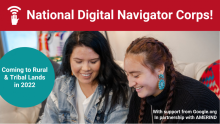
Two years after launching a community-based model to help residents overcome the digital skills challenges that keep so many offline, the National Digital Inclusion Alliance (NDIA) announced in February 2022 that it has received a $10 million grant from Alphabet subsidiary Google to dramatically expand the impact of its Digital Navigator Corps model across the country. The money will allow NDIA to take the Corps nationwide to 18 new rural communities (including Tribal sites), helping thousands of people overcome adoption barriers with the help of local experts.
Filling a Need at the Onset of the Covid-19 Pandemic
In August of 2020, NDIA first announced the launch of its new venture - the Digital Navigator initiative - to directly reach the many households across the United States that have access to wireline infrastructure but lack the knowledge, skills, trust, or comfort to turn that possibility into an affordable connection. The goal was to help people “get connected with affordable home Internet [access], find affordable computing devices, and learn basic digital skills,” and was borne directly out of the onset of the Covid-19 pandemic the previous spring.
The Salt Lake Public Library and Rural LISC were pilot partners, but NDIA has since worked with more than 20 organizations and communities over the last two years in addition to releasing a cornucopia of resources for cities and anchor institutions that to adapt and use as they see fit, in places as wide ranging as Austin, Cleveland, Denver, Nashville, Philadelphia, Portland, Providence, and Seattle. All of this work has led to refinement of the Digital Navigator model while also helping thousands get and stay online.
The grant will allow NDIA to expand its reach manyfold, launching a cohesive Navigator Corps across 18 new rural communities, as well as further refine the model and increase its data collection capacity to improve delivery.
Communities Apply!
One of the biggest pieces of news to come out of the announcement is a formal partnership with AMERIND, a tribally owned firm that helps those communities plan, build, and finance connectivity solutions. The grant will allow the hiring of a new staff member to work directly on the initiative.
“When access to the Internet, a computer, and tech support keeps a community member from education, work, healthcare, and all the necessities of life, it is heartbreaking. We must address any and all barriers to digital equity. This is what digital navigators do – weave digital support into our social safety net,” said Angela Siefer, executive director of NDIA. “We’re thrilled to have the support of Google.org to build a digital navigator model in rural and Tribal lands, both supporting those communities and further defining digital navigator programs for the benefit of the whole country.”
Here’s how the process of picking those 18 new community partners will work:
NDIA will launch a public process in spring 2022 to identify 18 established community organizations – such as social service agencies, libraries, and health clinics – and fund the creation of digital navigator programs. The navigator will connect individuals with the technological resources that will be most helpful to their communities; from broadband deployment, home internet connectivity, devices, and digital skills training.
Importantly, applications are restricted to rural communities, which face some of the most persistent and pernicious challenges to overcoming digital inequity. A webinar will be held next month to answer questions and go over the RFP process. Learn more about the Digital Navigator Model here.
The grant and explosion in popularity and use of the model is a testament to the barriers that remain even after wireline or wireless access reaches homes and connections are made affordable.
Applications are due in April 2022, with winners announced in June. Questions about the initiative should be directed to DigNavSupport@digitalinclusion.org. Learn more here, or listen to Episode 442 of the Community Broadband Bits podcast below to hear more about the program and its work with the Salt Lake City Public Library.
Header image from NDIA accouncement CC BY-ND







